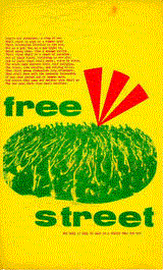
In reponse to the recent posts on this blog about the sexual revolution, Retired Waif suggested that I read Joan Didion's iconic essay "Slouching Towards Bethlehem" (I had never read Didion, although the eponymous book and several others by her were in my childhood home; I found I didn't like her style, but I suppose that's mainly because it's been so widely imitated). The essay is every bit as chilling as the poem from which Didion took her title. Didion has gone to Haight-Ashbury in the spring of 1967 to cover the desultory youth movement there, which is mostly a loose coalition of drug-addled teenagers who have descended upon San Francisco in a vague attempt to shuck off the repressive strictures of home and school. Drugs are the fulcrum about which this coalition pivots, and there are famous scenes of a five-year-old on acid (she is a pupil in "High Kindergarten") and a three-year-old who starts a fire in a commune while trying to light an incense stick. Didion's preamble sounds eerily like our own times:
The center was not holding. It was a country of bankruptcy notices and public-auction announcements and commonplace reports of casual killings and misplaced children and abandoned homes and vandals who misspelled even the four-letter words they scrawled.
(There, however, the similarity to our times ends, for "in the cold late spring of 1967 . . . the market was steady and the G.N.P. high and a great many articulate people seemed to have a sense of high social purpose.")
In a sort of reversal of the trajectory of, say, The Great Gatsby, in which the protagonists leave the innocent, golden West and become corrupted in the East, Didion's California is a hollow paradise, a place that lures the young with promises of redemption and fulfillment, of a return to innocence, of an exegesis of transcendental mysteries and a spiritual completeness, but delivers instead a total breakdown of morals and a drug-hazed anomie which barely cloaks the everpresent threat of violence. In light of this, it is jarring to note the fondness with which many baby boomers regard this time and place, which Didion describes as "the desperate attempt of a handful of pathetically unequipped children to create a community in a social vacuum." She has harsh words for a society that, in the period after World War II, has atomized into self-sufficient nuclear families; it is not just in the inchoate youth rebellion in San Francisco that things have broken down, she suggests, but even in straight, mainstream American culture:
At some point between 1945 and 1967 we had somehow neglected to tell these children the rules of the game we happened to be playing. Maybe we had stopped believing in the rules ourselves . . . Maybe there were just too few people around to do the telling. These were children who grew up cut loose from the web of cousins and great-aunts and family doctors and lifelong neighbors who had traditionally suggested and enforced the society's values. They are children who have moved around a lot . . . They are less in rebellion against the society than ignorant of it, able only to feed back certain of its most publicized self-doubts.
I believe the anomie lived out by the generation of '67 is still very much with us; only now it's no longer on the fringes, but has sunk into the very marrow of our society.










